Chris Baty's Blog, page 197
December 5, 2013
Young Writer Chronicles: Teenage Geniuses, Aliens, and Novelists
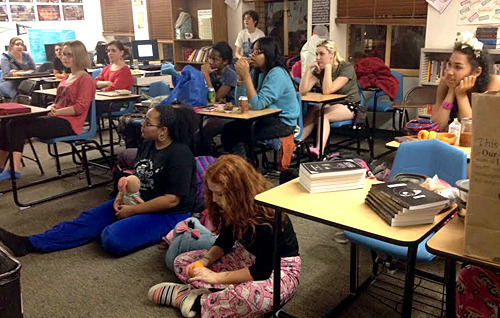
High school students at the Oakland School for the Arts have been participating in NaNoWriMo’s Young Writers Program for years. This year, led by educator Kate Schatz, they had a NaNoWriMo that made us at HQ jealous. We’ve asked them to tell us about their month; today, Kate shares what her students have in common with aliens:
If Oakland School for the Arts is a rare planet in a familiar sky, then its Literary Arts emphasis is another galaxy, as-yet-undiscovered, barely dreamed of. My students are a magical gorgeous alien species, preferring to spend a Friday night novel-writing at their school; perfecting their literary reading snaps; pouring their smarty-pants souls onto the page day after day, and then willingly sharing it all with their peers.
And if they’re the aliens in this far-off world, then I’m honored and always delighted to be some kind of astronaut teacher, bouncing among them day after day, absorbing and observing their unique and special powers.
Poorly though-out space metaphors aside, I’ll just say this: OSA—an urban public 6-12th grade charter school located in the heart of downtown Oakland in the historic Fox Theater—is an awesome school.
And the School of Literary Arts, which I’m privileged to Chair (is Chair a verb?), is extra awesome. My co-teachers and I get to spend our days with thirty-eight young writers whose work is bold, beautiful, raw, and radiant. As arts educators we have immense freedom when it comes to creating and designing innovative, challenging, and relevant curriculum—that’s why I’ve been able to do NaNoWriMo in my classes for the past four years.
Every year November is met with a mix of joy and dread (often the two combine for a kind of excited anxiety) from my students as they set their own word count, based on what they believe will be a realistic yet challenging goal. We brainstorm ideas and discuss them out loud; we make character sketches and write back-of-the-book blurbs. We plan and freewrite and imagine and then—come November 1, we write. Every day. The classroom becomes a quiet place as students get lost in the worlds that they’re rapidly creating.
They don’t all love it, as it’s really not for everyone. Some students are sprinters, less inclined toward the marathon novel. Some are poets, daunted by so much narrative. But I ask that they try it, at least once, and most years there are alternative assignments for those who wish (this year, poetry students could opt to create an 18-poem chapbook instead).
For these incredible young writers who delight in starting stories but tend to struggle with seeing them through, NaNo is a chance to set goals, to experience a sustained and focused project. It’s a glimpse into the “life of a writer”, a taste of what it is to work on a piece every day. Perhaps most importantly, it’s an experiment in tamping down and sneaking past that inner editor, that voice that makes them doubt and delete, doubt and delete.
It’s also a community-builder, as they’re all in this crazy wacky Sisyphean madness together (“What does ‘Sisyphean’ mean?” asked my 9th grade student Max recently. “It’s like an impossible task,” I replied. “Oh,” he said. “Like writing a 50,000 word novel in a month!” Yup.)
This year, students held write-ins at each others’ houses, and NaNo culminated in an epic lock-in, where 23 students held a novel-writing slumber party at the school, replete with pizza, gossip, dance parties—and a cumulative word count of over 40,000 in one night!
I didn’t manage NaNo myself, this year—with 38 students at school, and a 4-year-old and a brand-new baby at home, I decided to skip this one, and get back to my own novel in January 2014. But mark my words (seriously you, guys—mark my words! Remind me that I wrote this!), I’ll be doing it next year, alongside my favorite teenaged geniuses.
Kate Schatz is a writer, editor, and educator. She is the Chair of the School of Literary Arts at Oakland School for the Arts. Her book of fiction Rid of Me: A Story was published in 2007 as part of Continuum Press’ acclaimed 33 1/3 series. Her short story “Folsom, Survivor” was included as a 2010 Notable Short Story in Best American Short Stories 2011. She is one of three founding editors and publishers of The Encyclopedia Project. She is currently working on a novel tentatively titled For the Best.
December 4, 2013
30 Covers, 30 Days 2013: The Finale
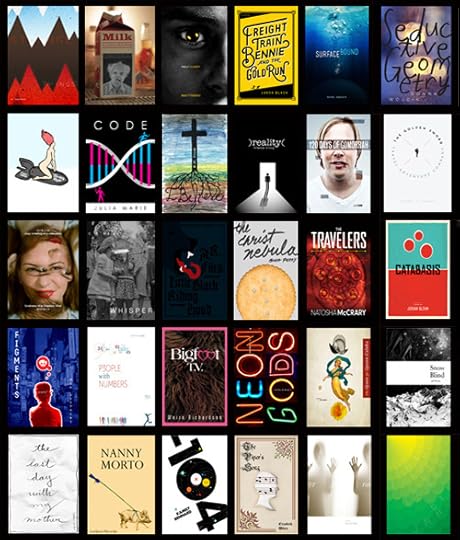
And the bell tolls on another great November! 30 Covers, 30 Days was a whopping success: thirty lucky people, out of nearly 5,500, were chosen to have unique covers designed for their synopses. Every morning featured a new and enticing piece of bookish art—from science fiction, to humor, to memoir; each day promised an exciting visual quirk, and offered an inspiration to keep writing.
So, thank you, thank you, thank you to everyone who worked so hard to put this project together. Thank you to the gifted and talented designers who feasted on 24 hours of spontaneous creativity and put together thirty of the most beautiful covers I have ever seen.
Thank you to Debbie Millman, for facilitating this project, and for being so fun to work with.
Thank you to everyone who has followed the project throughout the month, talked about the covers in the forums, and liked the posts on our blog.
And, finally, thank you to all of the amazing, imaginative, and daring people who took the time and had the courage to nominate their synopses. If it wasn’t for you, there would be no 30 Covers, 30 Days.
The 2013 genre breakdown looked a little like this:
Science Fiction: 5
Historical Fiction: 2
Literary/Mainstream Fiction: 5
Mystery/Suspense/Thriller: 5
Fantasy: 5
Young Adult: 4
Memoir: 1
Humor/Satire: 3
And, please put your hands together for our lovely designers:
Alberto Rigau
Andrew Twigg
Ari Asercion
Austin Beckstrom
Bill Klingensmith
Bryony Gomez-Palacio
Cary M. King
Christine Mau
Debbie Millman
Erin Newport
Felix Sockwell
Hannah Rubin
Jennifer and Ken Visocky O’Grady
Jill Spaeth
John DeGore
Jose Nieto
Josh Silverman
Kyle Hildebrant
Maria Popova
Mark Dudlik
Mark Kingsley
Santiago Carrasquilla
Seth Johnson
Tanner Woodford
Thy Doan
Tony Pinto
Traci Moore Clay
Val Lehnerd
Von Glitschka
Zipeng Zhu
Have a great December folks. And even though NaNoWriMo is (technically) over, I hope you keep writing!
— Hannah
December 3, 2013
NaNo Coach: Pushing Past the Land of First Drafts
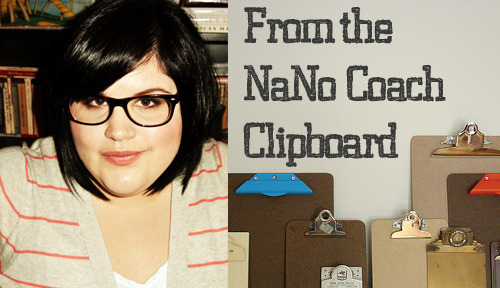
This season, we’ve brought on published authors to serve as NaNo Coaches to help guide you to reaching 50,000 words. Our final NaNo Coach, author Julie Murphy, shares her words of wisdom:
Whether you won NaNoWriMo, made a valiant attempt, or met your own personal goal, you are here! *points to December on calendar*
You made it through November, and even if you didn’t hit 50K, you forced yourself to face my own worst fear: the blinking cursor on a blank document. But… now what?
Writing a novel in a month is exhilarating: It’s the cliff diving of noveling. But it’s also exhausting. So, give yourself a breather. It’s easy to lose steam during that last week of NaNoWriMo, and the best fix is to restock your supply of inspiration. So, all the movies, books, television, plays, art exhibits, and social functions you shunned during the month of November? Time to play catch up! Rejoin civilization and absorb as much as you can. The currency of writing is life experiences, so power down the computer and stock up.
But don’t forget. There’s still work to be done.
There’s a certain magic that comes with working on your novel during the month of November, but without the friendly peer pressure and infectious NaNoWriMo community, it’s easy to let the time you dedicate to writing dwindle. If you’re one of those total prodigies who can turn the writing switch on and off, I would like to pay you in my tears for your secrets. Because, although I’m trying, I am so not that writer.
The hardest thing I’ve had to learn since transitioning into writing as a career is that deadlines wait for no one and that the best way to make writing a job is to treat it like a job. It’s time to take the fever that is NaNoWriMo and turn it into a mostly healthy writing habit. You don’t have to write 1,667 words a day or edit fifty pages in one sitting, but you owe it to yourself to make writing a consistent presence in your life.
I am not a finisher. I am a starter. A total starter. I can write the pants off of the first three chapters of any project—as such, my computer is a graveyard of unfinished novels. NaNoWriMo is the perfect fire starter. It pushes people like me past the first three chapters and into The Land of First Drafts.
Don’t let your NaNo-novel waste away in your desktop graveyard. Refuel. Spark the magic that wrote those first pages and when the magic runs out, keep going because as you learned during NaNoWriMo, sometimes you have to write even when you don’t feel like it. Even when the inspiration isn’t there.
December 2, 2013
Five Tips for NaNoWriMo: The Post-NaNo Reentry Process
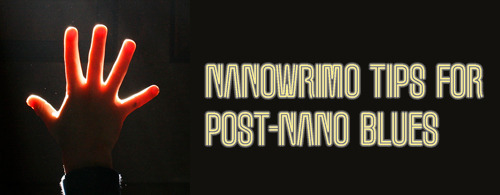
Editorial director Tim Kim helps you navigate the post-November landscape:
November is over, and—while at times during the month, you couldn’t wait for it to be over—it’s a little sad that NaNoWriMo 2013 is over, isn’t it? Now: you probably spent much of November holed up in your writing corner, ignoring the growing pile of dishes, laundry, and/or loved ones at your door. Here now are my five tips for reentry into the world:
Bask in the glory of your accomplishment.
Put your life back into order while letting your novel breathe.
Reacquaint yourself with these strangers who say they know you. Recruit one as a beta reader.
Reclassify candy as a non-essential food group, and get fit for the hard work of editing.
Own your accomplishment, and gather your spoils.
NUMBER ONE: Bask in the glory of your accomplishment.
You did a hard thing this November. Where others say, “One day,” you said, “Today.” That’s tougher than it sounds. You refused to be intimidated by time, by hard work, by the voices around you that insinuate your story isn’t important.
Everyone writes for a different reason: for personal reflection, for an audience, for the sake of a character who just won’t leave you alone. The important thing? This month, you wrote. It’s easy to sneer, or tear down, or question whether the world really needs more points of view, or stories, or creativity. It’s hard to create.
…Please don’t laugh if we shed a tear as we high-five you. It’s just because you high-five really hard, we swear.
NUMBER TWO: Put your life back into order while letting your novel breathe.
Nobody blames you for letting a few inconsequential things slip while you were putting the writing pedal to the metal in November. Sure, someone cordoned off the kitchen sink with caution tape, but, hey, who hasn’t had that happen at least once?
Key tools for this sort of industrial-strength clean-up? A fire hose, a dumpster, and, like, ten cases of Febreze. Even better, you can let the fresh first draft of your novel breathe: come back in a month after your house is habitable again, and you’ll find you’re ready to look at it with fresh eyes.
NUMBER THREE: Reacquaint yourself with these strangers who say they are your partner/child/best friend/parent. Recruit a beta reader.
You know they look familiar. When you swear you know them from somewhere, they put on an exasperated face and say, “Yeah, from when we lived in the same house for a DECADE.”
Sure, they might be crazy, but you begin to remember, hazily, that you had a family once. Smile brightly, lie breezily, “Oh, of course! Duh,” and then tell them you wrote a novel. The weight of this accomplishment should immediately smooth over any bumps in the road, and you can then talk about your story until you remember the exact role in your life the person in front of you plays and whether or not they would make a suitable beta reader for your novel. (If not, check out our forums!)
NUMBER FOUR: Reclassify candy as a non-essential food group, and get fit for the hard work of editing.
Obviously, November comes with a retooled food pyramid. Candy, chocolate, and caffeine become part of the base of a writer’s diet: this is a simple fact of life (If you’re American, Thanksgiving also contributes to the no-cares-given diet of November). Besides, writing burns off calories, mostly because of all that frantic slamming of your head against your keyboard.
Editing, though, is an even longer game than first-draft writing. Get lean, get mean, go green with a salad or two, then come back in the new year for our “Now What?” Months. From January through February, we’ll be guiding folks through editing, revision, and publishing, and we’re not saying we’ll be drill coach-y, but we’ll be drill coach-y.
NUMBER FIVE: Own your accomplishment, and gather your spoils.
Every victor gets some loot: on December 5, we’ll load up your winner page with goodies from our sponsors, including a physical, paperback copy of your novel, publishing opportunities, and more.
Finished your novel before December 1, but didn’t get to validate your novel in time? We can help!
Thank you so much for writing with us this November. You are awesome, and no, we’re not backing away, of course we wouldn’t leave without saying goodbye, what, are we animals?
I mean, I can see why we might try, because it’s really hard to say goodbye to you, and we don’t want you to see us cry, the high five was embarrassing enough as it was, and whoa, how did I end up out the door; we’ll see you during Camp NaNoWriMo, maybe?
November 30, 2013
"Relax. No, celebrate. You were meant to be on this road you’re walking. And because others have..."
Relax. No, celebrate. You were meant to be on this road you’re walking. And because others have walked it before, you can do so as well—if you do not give up.
What we all have in common is our desire to tell a well-crafted story. To create characters and worlds that stand the test of time—be it one month, five years, or a hundred. So do you. Tell your story.
”- Sharon G. Flake, on soaring.
30 Covers, 30 Days: Day 30
Hurrah! It is day 30 (can you believe it?) Our final cover was designed by Zipeng Zhu, based off of a synopsis written by J. M. H.
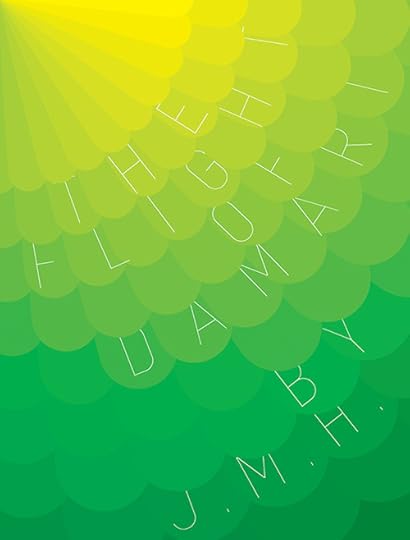
The Flight of Damari by J. M. H.
Yellow-naped Amazon parrot, Damari, has everything a pet could ever need. Food, water, and a nice family with children. But when his family leaves home, he is determined to find them until he meets two other fowl, who tell him about the great land of birds, Avicus.
Damari realizes that he should take flight into the sky to find his destiny in this strange land, becoming a hero.
About the Designer
Zipeng Zhu is a designer in New York City who wants to make everyday a razzle-dazzle musical. Before he ate cheese and spoke English, he was eating rice and speaking Mandarin and Cantonese in China. He currently works at Sagmeister & Walsh.
November 29, 2013
Wrimos Around The World: Of Grandfather Chairs, Grounding Characters, and Escape
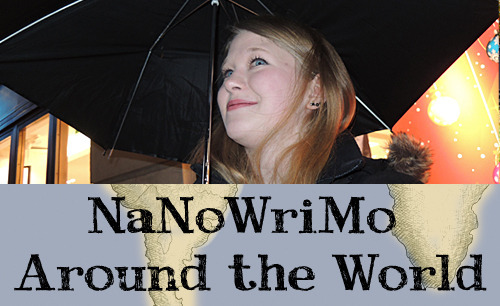
One of the best parts of NaNoWriMo? The incredible community of writers. This week, we spotlight Kathrin Schönfelder in Vienna, Austria:
Kathrin: I’m originally from Carinthia, a province in the south of Austria—but ever since my sister moved to Vienna when I was seven I wanted to come here as well.
The writing community in Vienna is divided into different groups. Some take themselves very seriously, and some are a bit scared of this big dream of becoming a professional writer. Living in Austria, you’re surrounded by different cultural influences. If you’re trying to make it in the artistic world people will judge you. It simply takes a lot of guts to try and live this dream—but it’s not impossible and absolutely worth it!
What is unique about where you are writing from?
Kathrin: I’m usually one of the stay-at-home-writers. I like to hang out in my own, well-known environment and be by myself and my thoughts. I listen to music and eat a lot of chocolate, cupcakes, and cookies while speculating about my loved-and-hated plot holes and shout, laugh, and even cry every now and then.
This year I’m trying something new though: I’ll be going to a library every day to try and write there. I always feel like libraries have a special kind of magic in them—everyone is reading and escaping reality, even if it’s just for a short while. (Another plus—if you’re there early enough to get the best tables the view is spectacular!)
How would you describe your writing set-up in six words?
Kathrin: In my room, grandfather chair, Apfelstrudel.
Do you have any writing tips that have been inspired by your writing process this year so far?
Kathrin: Easy. Just don’t stop. Never stop writing. Even if you’re behind in this fourth week, just keep going. Is your protagonist developing a whole new personality? Is your protagonist acting like a rebellious teenager that wants to show you, as the writing mom or dad, who’s boss? Let them go free for a while but try and bring them back by scaring them. Tell them who’s boss. Tell them you’ll ground them if they don’t come back and work with you. Just don’t stop writing. November is for writing—the rest of the year is for editing.
If necessary, work through break-downs by screaming and shouting to some angry music. Go outside and run around your block. Call your best friend and cry. Then come back and write. Breathe. Eat a cookie. Everything will be fine.
30 Covers, 30 Days: Day 29
Today’s cover was designed by Erin Newport, based off of Laila Murphy’s synopsis.
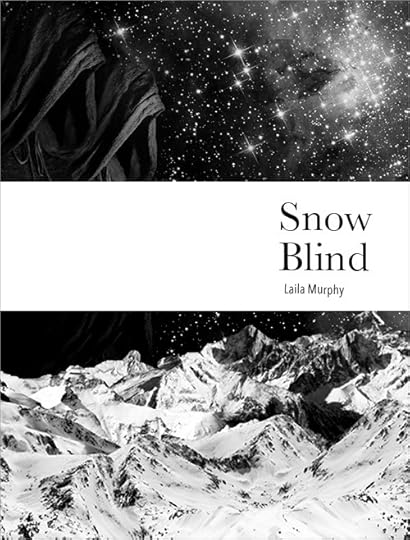
Snow Blind by Laila Murphy
Deep in the mountains live the Order of Clerics. Clothed in hooded robes of red, they never leave their halls, observing the outside world through hundreds of snow globes. But the Clerics do more than watch. They ‘intervene’. Land being over-farmed? A flash flood will level the plain. Too many trees being cut down? An ‘accident’ for the woodcutter takes care of that. A village becoming over-populated? A swift plague reduces numbers. And so the delicate balance between man and nature is maintained. All Clerics live by The Code. The number one rule? They Must Not Know We Exist.
Reeva, a teenage apprentice, is also gifted with the power to manipulate the world around her but when she is expelled from the Order, she must make her own way in a Nordic land of forests, wolves and snow she has only ever observed from a distance and has no hope of surviving in.
Her fortunes change when she meets Erik and Calvin, two brothers trekking through the wilderness to find a cure for the mysterious illness that ails their sister. Reeva recognises them—they were unfortunate bystanders in her intervention that went wrong and got her expelled.
Can Reeva return to the only life she understands without anyone uncovering what she is? What will Erik and Calvin do if they discover that their lives are not in the hands of Fate—but the Clerics?
About the Designer
Erin Newport is a recent graduate of Wesleyan University and lives in Oakland, California.
November 28, 2013
On Savoring Your Novel
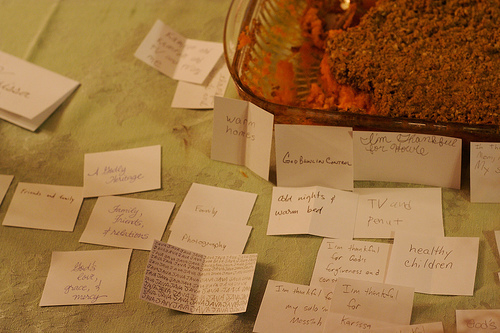
One of the biggest benefits of NaNoWriMo for me is the creative momentum it spawns, even beyond November. Each year I’m energized by the imaginative sparks (and sometimes flames) that result from immersing myself in writing. I also learn (and relearn) important things about time management, discipline, and the value of writing with others.
But … sometimes the very creative momentum I prize so much wanes in the general hecticness of life. The monstrous bite of my to-do list can be scarier than any of my antagonists’ snarls. This year, I’m asking myself how to nurture the writing breakthroughs I’ve experienced this month and find ways to keep them going year-round.
I just discovered one simple technique: savor the good experiences of writing because momentum is fed by positive thoughts. According to Fred Bryant, a social psychologist at Loyola University Chicago, just by reflecting on your feelings during positive events, you can better incorporate those activities into your life and keep good things going.
Here are some of Bryant’s savoring techniques:
1) Give thanks. It’s easy to take good experiences for granted. I’m pausing, especially today, to bow in gratitude to the multitudinous muses of November. I didn’t have this novel in October. I wouldn’t have it now without NaNoWriMo. A whole new world exists, and I want to keep exploring it. (By the way, there’s a vibrant NaNo Facebook gratitude session going on. It’s good to read engage in others’ thanks as well).
2) Congratulate yourself. Don’t hesitate to pat yourself on the back and take credit for your hard work, Bryant says. Research shows that people who revel in their successes are more likely to enjoy the outcome. Yes, sometimes our humility can get in the way—so give yourself the wildest, whooping high five you can imagine.
3) Share your good feelings with others. Whether you wrote 5,000 words or 50,000, you’ve done something pretty dang big: you made creativity a priority in your life. You’re now a role model of imaginative derring-do for others. Spread the gospel. Revel in it.
4) Take a mental photograph. Pause for a moment and consciously think about what was fun, meaningful, life expanding, wacky, or wonderful about writing a novel this month. Focus on those moments going forward, and banish any memories of painful writer’s block or sleep-deprived eyes.
5) Look back on your accomplishment from the future. Think about yourself years from now looking back on the novel you wrote this month. You could have spent the month watching Smurf reruns or practicing your aim with a squirt gun, but you did something unforgettable. You did something big. You wrote a novel.
What are some ways you’re savoring your novel?
—Grant
Photo by Flickr user DeaPeaJay.
Young Writer Chronicles: A Literary Lock-In

High school students at the Oakland School for the Arts have been participating in NaNoWriMo’s Young Writers Program for years. This year, led by educator Kate Schatz, they had a NaNoWriMo that made us at HQ jealous. We’ve asked them to tell us about their month; today, sophomore Sara advocates for NaNoWriMo as holiday:
NaNoWriMo, in my section of my school, is a holiday. Much like Christmas or Halloween, there is candy, commiseration, and a Facebook post or two that promotes the feeling that someone is doing this far better than you are.
Every weekend is a different party—er, write-in—complete with food, laughter, and occasional complaints of characters entering relationships without the consent of their author. Each year, our festivities (and our word counts!) get bigger. Last year, our efforts were concentrated during school hours, with occasional coffee-shop meetings on the weekends, and casual invites to come over and write. This year, however, we went above and beyond anything even we expected:
A Literary Lock-in.
We arrive at school at seven p.m., with pillows, blankets, and bags galore; we have pizza, enjoy the company, and rock out to some music. If you’ve ever seen a panda sneeze and fall over, you have an idea of how it felt to watch a cute, middle-aged woman (our chaperone) learn the dance to “Slaughter” and dance it with enthusiasm.
By nine, we had settled into the rooms on the 3rd floor—one dubbed The Quiet Writing Room, the other nameless, but which I personally dubbed “The Room I Want To Take Home”. It was filled with everyone’s pillows and sleeping bags, had a movie being projected about half the time, and had Christmas lights strung up all across one wall.
The Quiet Writing Room was where everything came together in 45-minute “writing sprints”. I’ve never been one for anything that contains the word “sprint”, so I wrote sitting on pillows in the other room. The Quiet was taken seriously: I went into the Quiet for the snacks, and got glared at for chewing pretzels.
After the usual talk (“Let’s stay up all night!” “The first ones who fall asleep get mustaches drawn on their face!”), and hours of writing, people started dropping like flies. Only a few of the toughest survived, going on sprint after sprint. I fell asleep around 4 a.m., only to wake up three hours later and discover that some people had not slept and were, indeed, writing. I’ve come to the conclusion that these people are insane, and I love them exponentially more for it every day.
Writing is difficult, and takes forever, and never turns out quite the way you thought it would. It’s the same with people—after spending the night eating and complaining, I found new friends, and some old ones I didn’t realize I still had. I think that sometimes we all just need a push in the right direction—a competition to see who can write more, or a room so dedicated to thinking that no one can chew without causing a disruption—to get the words out of our heads and onto the page.
And, NaNoWriMo? You’re my new favorite holiday.

Sara Mather is a sophomore at Oakland School for the Arts. She has been published on extrasforme.com, and hopes to become a journalist.
Chris Baty's Blog
- Chris Baty's profile
- 63 followers




